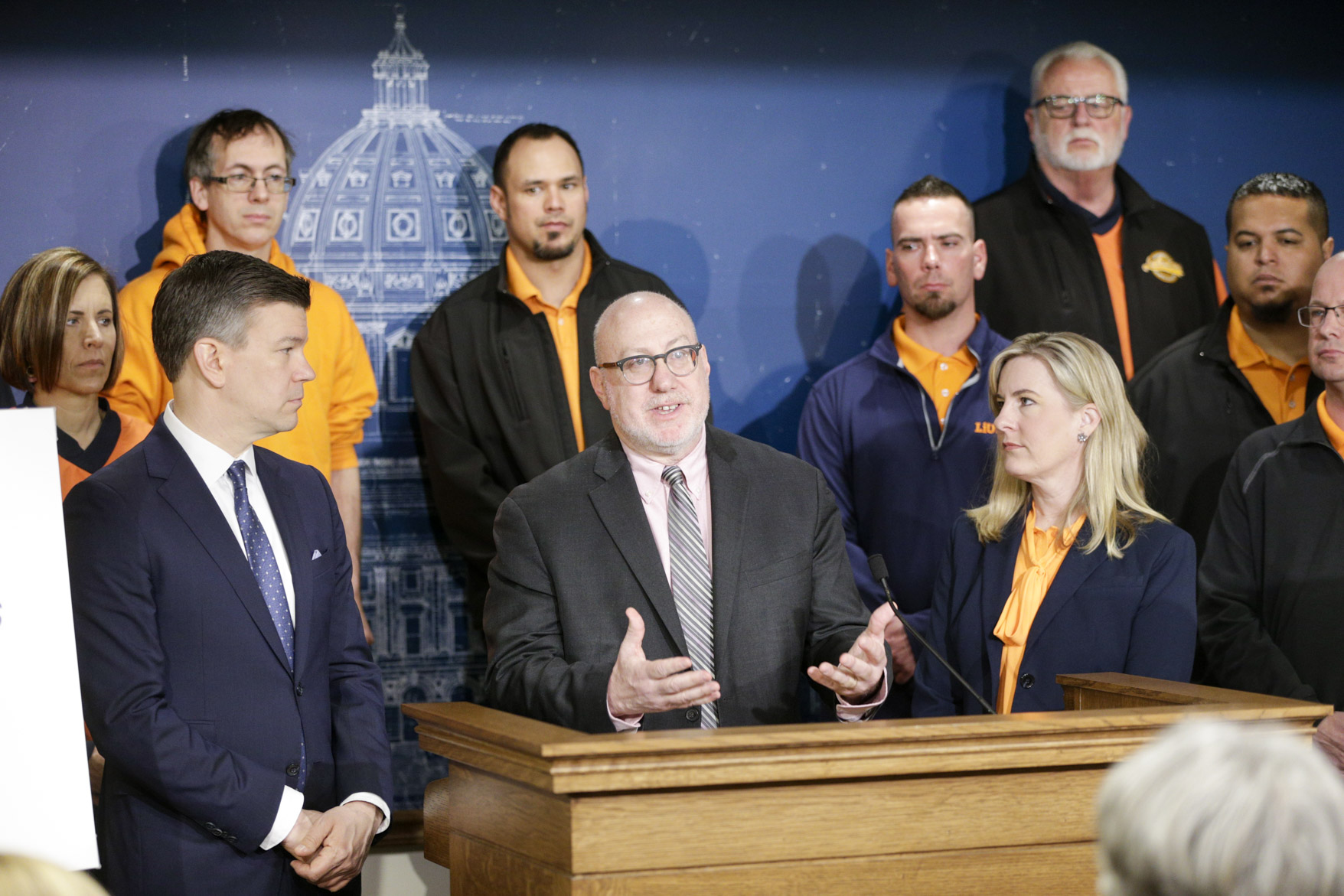House DFL mirrors Walz plan for boosting transportation investment through gas, metro sales tax increase

Minnesota’s roads, bridges and transit systems have suffered from years of underinvestment, House DFL leaders say. The omnibus transportation finance bill they released Tuesday aims to change that in a big way.
As amended, HF1555, sponsored by Rep. Frank Hornstein (DFL-Mpls), proposes to raise the state’s per-gallon gas tax by 5 cents per year over four years. That, DFL leaders say, would raise nearly $600 million in funding for the state’s road and bridge infrastructure in the 2020-21 biennium, and more than $1 billion in 2022-23.
“Minnesotans expect our transportation system to be safe, modern and efficient,” House Speaker Melissa Hortman (DFL-Brooklyn Park) said. “But our roads are crumbling, our bridges are structurally deficient and our transit system is underdeveloped.”
[MORE — See the spreadsheet]
Minnesota joins other Midwest states like neighboring Wisconsin (9 cents), Illinois (19 cents), and Michigan (45 cents) in considering proposals to raise the gas tax. The revenue would be constitutionally dedicated to spending on roads and bridges.
An increase in some tab fees — and bringing the motor vehicle sales tax in line with other sales taxes —would also fund additional spending. Older vehicles would see a decrease in tab fees.
Transit would also see a boost in funding under the plan.
HF1555 proposes to institute a half-cent sales tax increase in the seven-county Twin Cities metropolitan area to raise roughly $400 million over the next biennium for beefed-up transit service and additional projects. It is an area that advocates say Minnesota is falling behind in compared to other states and that has been neglected under previous Republican-controlled Legislatures.
The House DFL proposal largely mirrors one that Gov. Tim Walz put forward last month. Under the governor’s plan, the gas tax would rise by 20 cents a gallon over just two years, instead of four. The House proposal proposes a larger metro sales-tax increase than Walz’s budget, which calls for a hike of just one-eighth of a cent.
In total, the bill would appropriate roughly $7.3 billion over the 2020-21 biennium toward the state’s highways, bridges, local roads, railways, transit systems, airports and the Department of Public Safety.
Legislature divided on transportation
Senate Republicans in control of the Legislature’s other chamber have repeatedly expressed opposition to an increase in the gas tax and, in their own hearing Tuesday in the Senate Transportation Finance and Policy Committee, voted down a bill modeled after the governor’s plan.
Instead, they have favored plans, like SF10 sponsored by Sen. Scott Newman (R-Hutchinson), which would move funds from other areas of the state budget to boost road and bridge investment without tax increases. DFLers have called that approach irresponsible and say it would take General Fund dollars from other programs that benefit schools, seniors and health care.
“Minnesotans are not well served by driving on roads and bridges that are more than 50 years old,” Hornstein said. “It’s time to be responsible and fix our crumbling infrastructure.”
The House Transportation Finance and Policy Division, which Hornstein chairs, walked through the bill Tuesday afternoon. The panel is scheduled to take public testimony Wednesday before debating amendments and voting on the legislation Thursday.
Policy provisions
HF1555 also includes a number of policy items. Among them are those that would:
- establish a formula and appropriate $10 million from the General Fund in 2019 to reimburse deputy registrars negatively impacted by the state’s new license and registration system, MNLARS;
- increase filing fees for motor vehicle registration renewals, driver’s license and identification card renewals, and the issuance of a duplicate title on a motor vehicle;
- establish a state transportation goal of promoting the use of zero-emission electric vehicles;
- modify the state’s “move over” law to include recycling and solid waste vehicles;
- expand the Department of Transportation’s rail inspection program to allow two additional positions and broaden the scope of inspections that can be performed;
- direct the Metropolitan Council to expand Metro Mobility service to Lakeville and appropriate $1.9 million from the General Fund to cover costs; and
- rename various stretches of state highway in memoriam to Minnesotans of note, like former Rep. Tom Rukavina, and those who died in the line of duty.
What’s in the bill?
The following are selected bills that have been incorporated in part or in whole into the omnibus transportation finance bill:
Related Articles
Search Session Daily
Advanced Search OptionsPriority Dailies
Ways and Means Committee OKs proposed $512 million supplemental budget on party-line vote
By Mike Cook Meeting more needs or fiscal irresponsibility is one way to sum up the differences among the two parties on a supplemental spending package a year after a $72 billion state budg...
Meeting more needs or fiscal irresponsibility is one way to sum up the differences among the two parties on a supplemental spending package a year after a $72 billion state budg...
Minnesota’s projected budget surplus balloons to $3.7 billion, but fiscal pressure still looms
By Rob Hubbard Just as Minnesota has experienced a warmer winter than usual, so has the state’s budget outlook warmed over the past few months.
On Thursday, Minnesota Management and Budget...
Just as Minnesota has experienced a warmer winter than usual, so has the state’s budget outlook warmed over the past few months.
On Thursday, Minnesota Management and Budget...